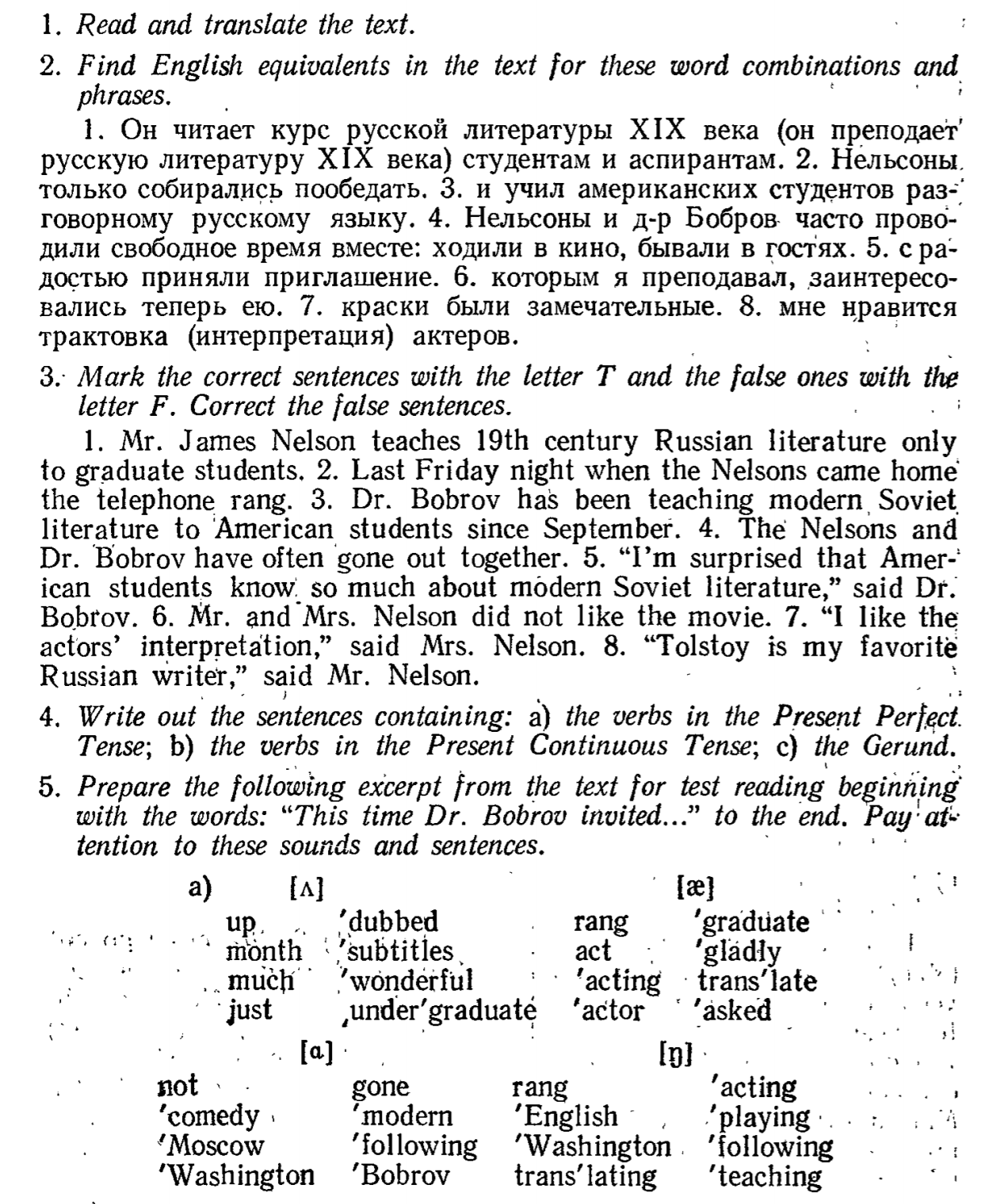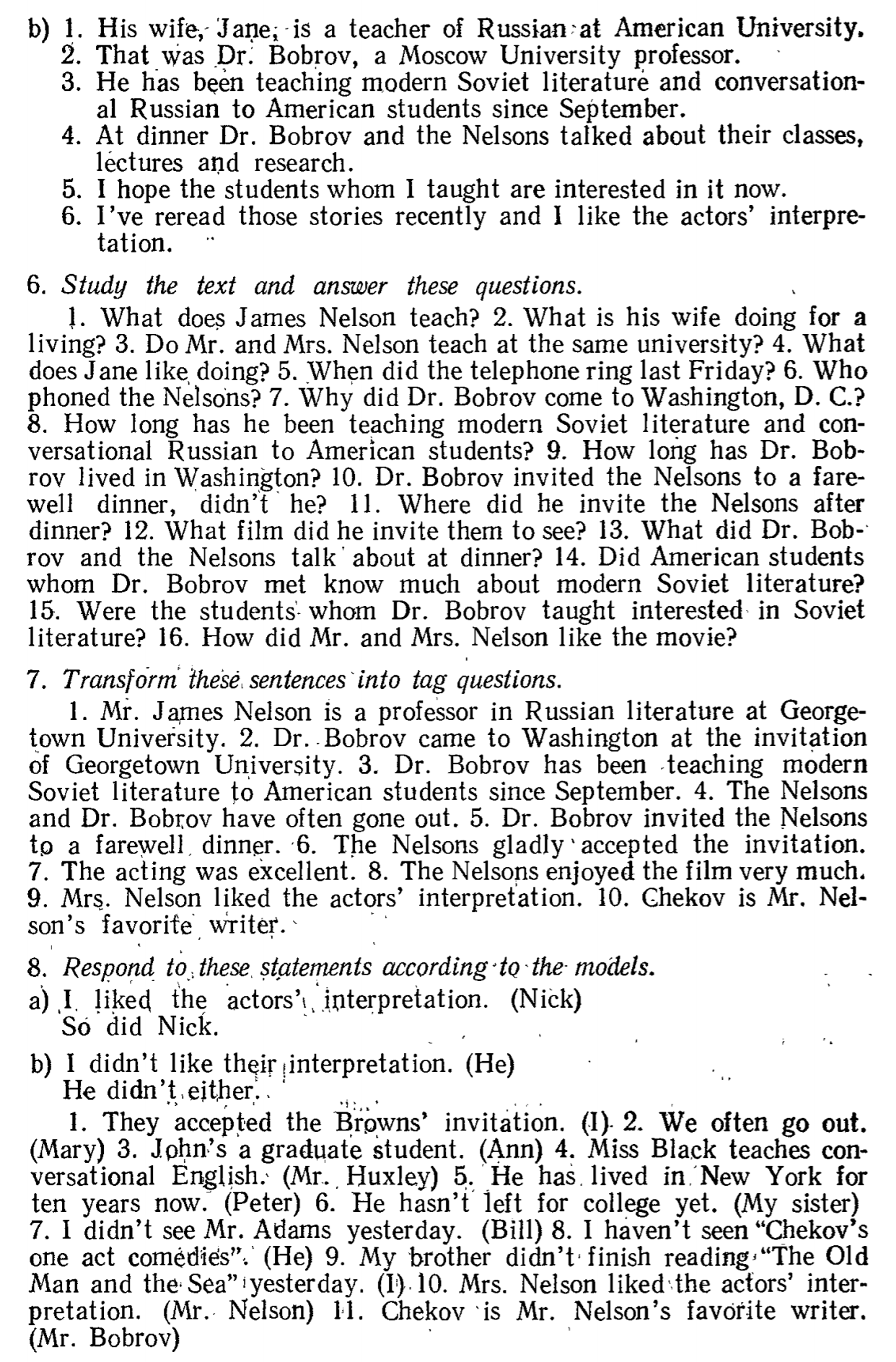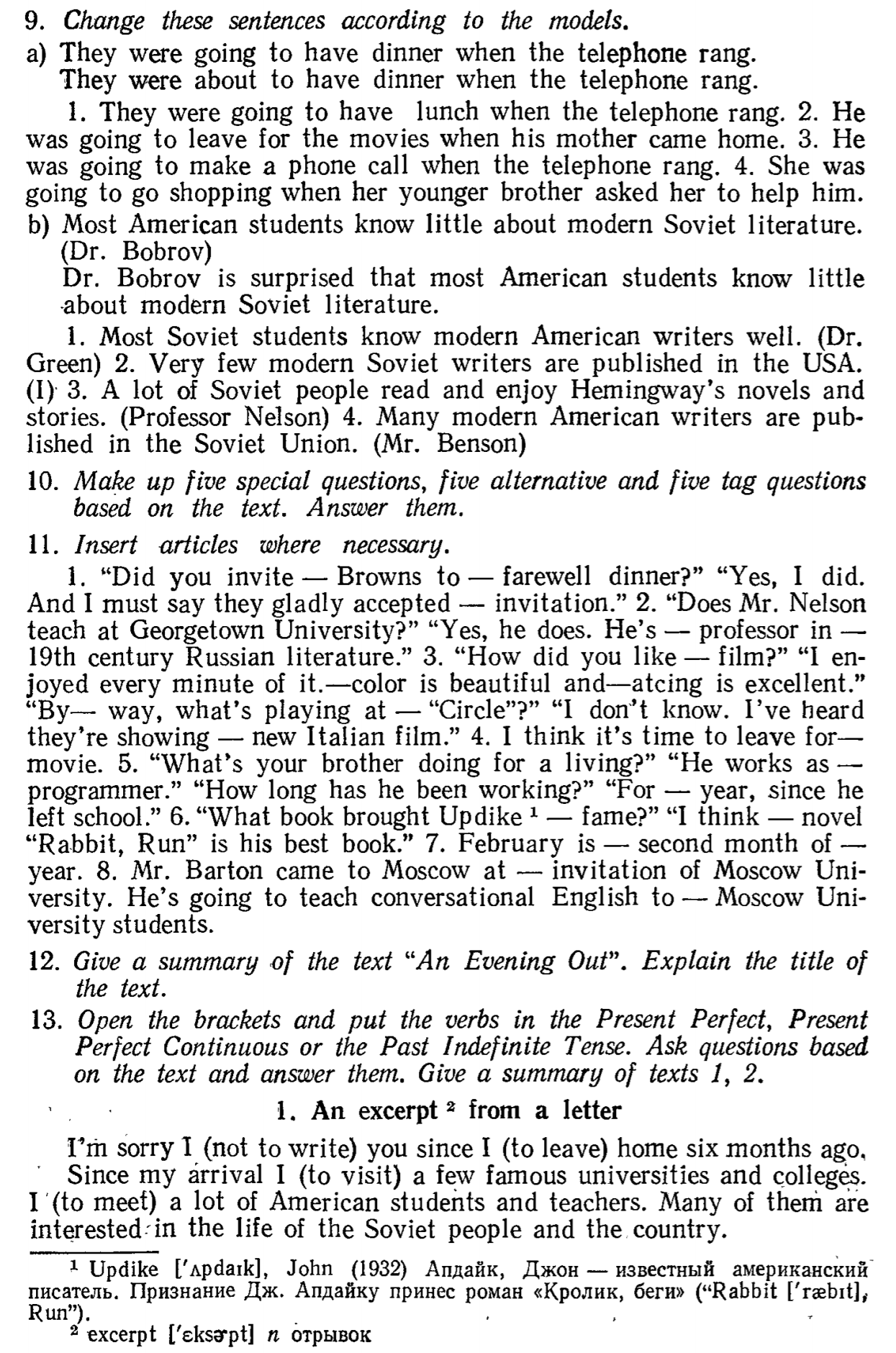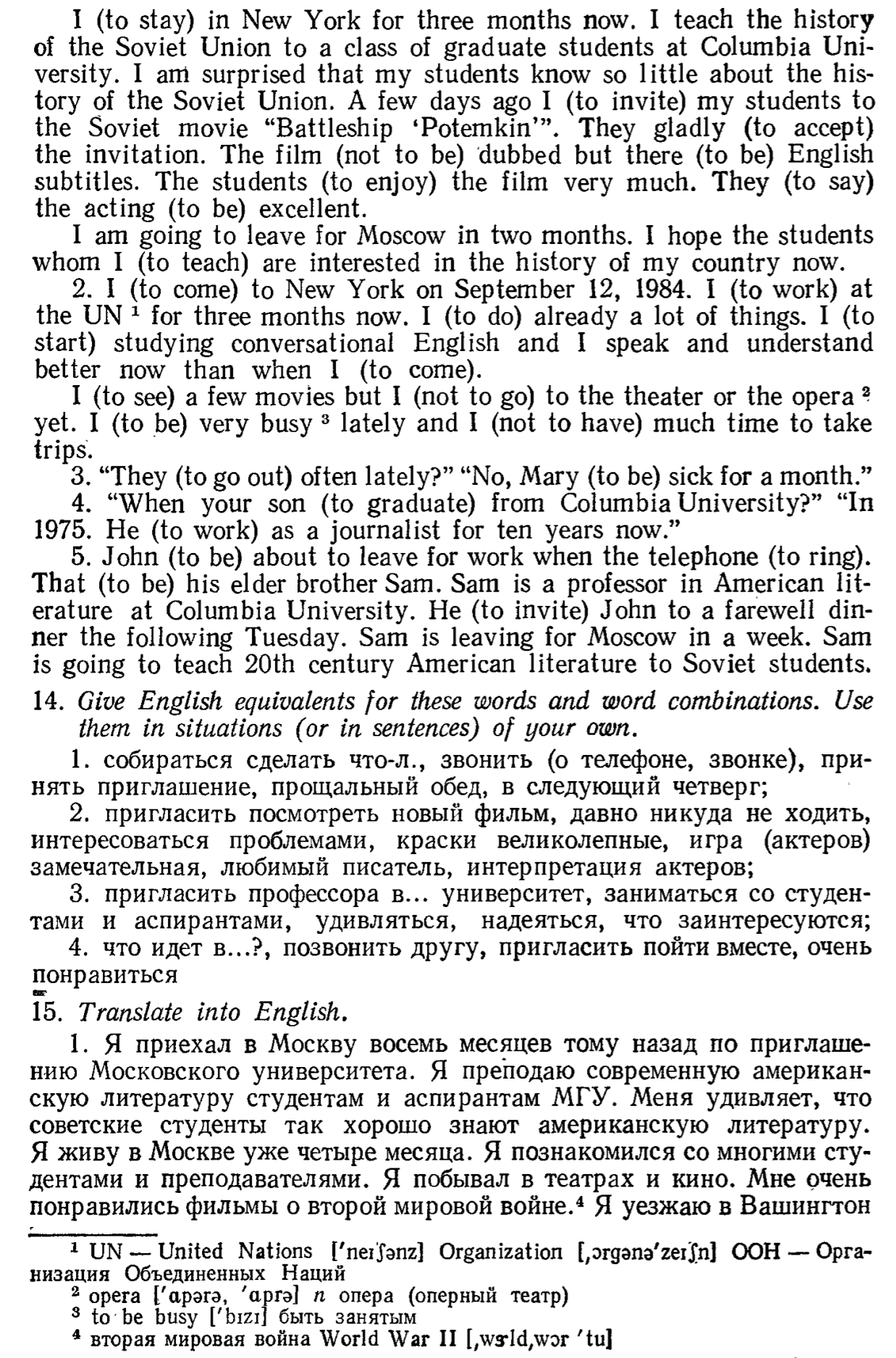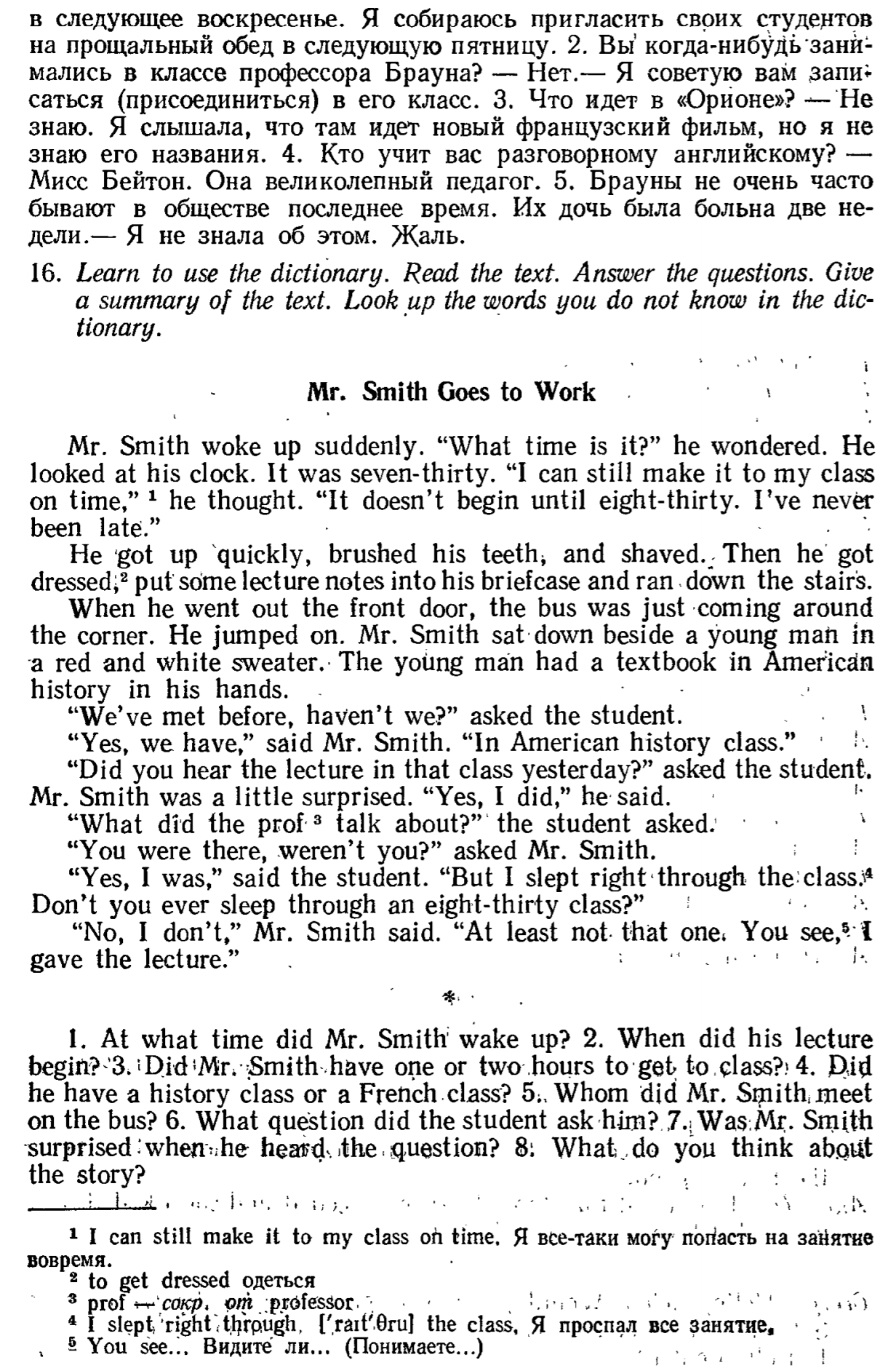→ LESSON 1
I. GRAMMAR EXERCISES
Нескучное онлайн-обучение английскому языку с помощью игр и интересных заданий Присоединяйтесь к 23 миллионам пользователей Lingualeo Английский по фильмам и сериалам. Учите английский с удовольствием!1. The Present Perfect Tense
1. Give the past participle of the following verbs.
a) standard verbs: to open, to shave, to join, to ask, to watch, to work, to look, to translate, to paint, to adopt, to answer, to prepare, to order, to publish, to finish;
b) non-standard verbs: to be, to do, to have, to buy, to come, to speak, to hear, to leave, to see, to spend, to tell, to think, to write, to wake, to learn, to begin
2. Read these sentences and translate them into Russian. Pag attention to the use of the Present Perfect Tense.
1. Mary has just gone out for a walk. 2. Have you prepared breakfast yet? 3. “Has your elder sister ever taught at school?” “No, she hasn’t.” 4. My elder brother has never had any trouble with mathematics. He likes it very much. 5. “Have they come back from Washington yet?” “No, they haven’t. They’re coming tomorrow.” 6. My mother has been sick this month. Now she’s better. 7. Jane has had a lot of things to do lately. 8. Miss Finch has been adviser to the school history club since she came to teach at our school. 9. We have known the Carlsons since 1975, for ten years now. 10. I haven’t seen Sally Blake since I left school. 11. “How long have you worked in the language laboratory?” “For three years.” 12. I joined the school mathematics club when I was in eighth grade and I’ve been a member ? ever since. 13. She’s already learned the new words. 14. It has been very cold this month. 15. I have been a student for two years now. 16. “Since when have you had that car, Jill?” “Since 1978.”
3. Roleplaying: make the necessary substitutions and act out these dialogs.
1. A: What’s Bill doing?
B: He’s reading Mark Twain's “Huckleberry Finn.'*
A: And what about you? Have you read it?
B: Yes, I have. I read it last month.
(B: Mark Twain’s “Adventures of Tom Sawyer”, Hemingway’s “The
Old Man and the Sea”)
2. A: I met Peter yesterday.
B: How’s he? I haven’t seen him lately.
A: He’s fine.
(At: Jane, Ben, John. B: this week, since he came back, for a month)
3. A: Nick has just come back from Moscow.
B: Oh, has he? How did he like it? I was there last year and I enjoyed my stay there very much.
A: He liked it very much, too.
4. A: How long have the Browns lived in Washington?
В: I think for ten years. They came here in 1975.
4. Respond to these requests according to the models.
a) Would you close the window, please? I’ve just closed it.1. Would you wake up Ann, please? 2. Would you read this text, please? 3. Would you do the sums, please? 4. Would you invite Mary to your birthday party, please? 5. Would you help John w ith his homework, please?
b) Is Jane going to have lunch now? She’s already had it.
1. Is Peter going to take a trip to the village of Florida? 2. Is Tess going to talk to Jill about it? 3. Are they going to join the French class?
4. Is Nick going to listen to the latest news?
c). I bought Hemingway’s “The Old Man and the Sea” last Friday. I’ve bought it too.
1. I looked through the papers this morning. 2. I ordered dinner ten minutes ago. 3. I asked Peter to help us yesterday. 4. I advised him to see the doctor last Monday. 5. I reread Tolstoy’s] “War and Peace” last month.
d) I haven’t read that book yet. Have you? No, I haven’t read it either. (No, I haven’t either.)
1. Mike hasn’t got up yet. Has John? 2. I haven’t bought a present for Ann yet. Have you? 3. John hasn’t done his homework yet. Has Bill? 4. I haven’t written to Peter yet. Have you? 5. He hasn’t learned the new words yet. Has Jane?
5. Respond to, these statements according to the models.
a) I had a nice dog a few years ago. (Bill) Has Bill ever had a dog?
1. I read an American novel last month. (Mary) 2. Jill worked in a library five years ago. (Jane) 3. Bill went to college four years ago. 4. Harry saw Chekov’s “Cherry Orchard” last Thursday. (Henry)
5. I had six classes yesterday, (you, a day) 6. I met a famous writer a few years ago. (you)
b) They’re going to see a new movie tonight. Haven’t they seen it yet?
1. They’re going to have dinner now .'2. He’s going to tran slate the text tomorrow. 3. She’s going to look through the new books. 4. Tom’s going to finish his new picture tomorrow. 5. They’re going to invite the Browns to dinner.
6. Respond to these questions according to the models. Pay attention to the Present Perfect and the Past Indefinite Tenses.
a) How long have you lived here? (since 1980, for five years) I’ve lived here since 1980 (for five years)
1. How long have you studied English? (since 1982; for two years)
2. How long have you worked in the University library? (since I came to study here) 3. How long has Peter lived in New York? (since he left school; for three and a half years) 4. How long has Ted Morton taught history? (since 1980; for five years) 5. How long have they been friends? (since 1978; for seven years) 6. How long have, you known him ? (since I met him at Peter’s birthday party) 7. How long has Jane spoken French? (since 1975; for ten years).
b) You’ve seen Mary’s new picture, haven’t you? (last Tuesday) Yes, I have. I saw it last Tuesday.
1. You’ve reread Twain’s “Innocents Abroad”, haven’t you? (last week) 2. He’s written to his elder brother, hasn’t he? (yesterday) 3. The Mortons have come back, haven’t they? (two days ago) 4. They’ve already had dinner, haven’t they? (an hour ago) 5. You’ve seen Peter today, haven’t you? (this morning). 6. He’s listened, to the latest news, hasn’t he? (an hour and a half ago).
7. Open the brackets and put the verbs' in the Present Perfect and Past Indefinite Tenses.
1. “Where’s Mary?” “She (to go shoppipg) just.” 2.’“How long Jane and Mary (to be) friends?” “I think since 1978, when they (to come) to study at New York University.” 3. “You ever (to have any trouble with) Spanish?” “No, I never (to have any trouble with) it. I like it very much.” 4. “Peter (to do) the sums yet?” “Yes', he has! He (to do) them two and a half hours ago.” 5. “The children (to have dinner) yet?” “No, not yet. They just (to come back) from the park/’ 6. Mr. Tomson (to be) adviser to the school mathematics club since he (to come) to teach at our school. 7. “How long you (to know) Peter В1а£к?” “I (to know) him since childhood.” 8. Bill (to join) the School French club when he (to be) in ninth grade and I (to be) a member ever since. 9. “How’s Ann? I (not to see) her lately.” “She’s fine, thank you.” 10. You (to have) a lot of things to do today? 11. 1 (to hek) that Mary (to be sick) this month. 12. “Since when you (to have) that house, Ben?” “Since 1976.”
8. Translate into English.
1. Сколько времени вы преподаете историю в этой школе? — Пять лет, с 1980 года.— А с к о л ь к о времени вы руководите цокольным историческим кружком? — Три года, с тех пор как'я начал преподавать историю в девятом классе. 2. Я слышал, что Д ж онболелв последнее время.— Да, он проболел три неделим а сейчас он чувствует себя лучше. 3. Ты уже сделал домашнее задание? Нет. Я сейчас , решаю за дачи. 4. Вы:когда-нибудь играли в шахматы с Биллом? Он хорошо играет? — Я не знаю.. Я никогда с ним не играл. 5. Вы уже завтракали (to have lunch)?— Нет еще.— Давайте позавтракаем сейчас в кафетерии. 6. Вы сегодня были в библиотеке? — Нет. Я был там вчера. 7. Вы давно говорите по-испански? — С детства. Я провел детство на Кубе (in Cuba). 8. Много ли вы посмотрели фильмов с тех пор, как приехали сюда? 9. Как себя чувствует ваша сестра? Я не видела ее в колледже в последнее время.— Она болеет уже месяц.— Как жаль! 10. Ник дома? — Он только что пошел прогуляться в парк. И . Вот уже два года,'как Джейн студентка.
2. The Present Perfect Continuous Tense
9. Read these sentences and translate them into Russian. Pay attention to the use of the Present Perfect Continuous Tense.
1. We’ve been doing sums for half an hour now. 2. Jane has been studying French for three months now. 3. Max has been trying to finish the picture for the last two weeks. 4. They’ve been talking for two hours now, 5. They’ve been playing chess since early morning. 6. “Have you been studying Spanish long?” “Since I joined the Spanish class in October.”
10. Respond to these questions according to the model.
How long have you been working in the office? (for a year; since 1980) I ’ve been working here for a year, (since 1980) 1. How long has Peter been working in the language laboratory? (for a year, and a half) 2, How long have you been studying history? (since 1978) 3. How long have you been writing the letter? (for fifteen minutes): 4. How long has Mike been looking through the papers? (for half an hour) 5. How long has Jane been doing her homework? (since four o ’clock) 6. How long have they been translating the text? (since eleven o’clock in the morning) 7. How long has Jill been watching TV? (for three hours now)
3. The Gerund
11. Read these sentences, and translate them into Russian.
1. When did you,start studying English? 2. Do you like reading humorous stories? 3. Women started fighting for their independence3 a hundred,years ago. ,4. Have you just started studying English? 5. The old friends .enjoyed talking about their childhood. 6. Ann began studying history .last year, 7. Did you enjoy having dinner with Mike? 8. A few minutes, later they finished.translating the text.
12. Make up sentences using the table. Translate them into Russian.
“I am French teacher”. Я преподаватель французского языка.' “So аm I” Я тоже. “So is' Ann.” Анна тоже.

13. Translate into English
1. Я только что перечитала «Простаки за границей» Марка Твена.— Я тоже. 2. Мне понравилась эта книга. Петру тоже. 3. Я вчера закончила читать «Старик и море» Хемингуэя. Джейн тоже. 4. Я очень люблю Чехова. Моя сестра тоже. 5. Мой старший брат изучает испанский язык.— Моя сестра тоже. 6. Я заболеваю гриппом.-— Я тоже. 7. Мы собираемся в кино сегодня вечером. Они тоже.
II. TEXT
AN EVENING OUT
Mr. James Nelson is a professor in Russian literature at Georgetown University,3’ Washington, D. C. He teaches 19th century Russian literature? to undergraduate and graduate students. His wife, Jane, is a teacher of Russian at American University.3 She likes translating modern Soviet writers into English.
Last Friday night the Nelsons were about to have dinner when the telephone rang. Mrs. Nelson picked up the receiver. That was Dr. Bobrov,4 a Moscow University professor. Dr. Bobrov came to Washington at the invitation of Georgetown University. He has been teaching modern Soviet literature and conversational Russian to American students since September. Dr. Bobrov has lived in Washington for nine months. The Nelsons and Dr. Bobrov have often- gone out together.
This time Dr. Bobrov invited Mr. and Mrs. Nelson to a farewell dinner the following Friday. He is leaving for Moscow in a week. He asked the Nelsons, “Would you like to go to the movies after dinner? The Soviet film “Chekov’s one act comedies” is playing at the “Circle”. The Nelsons gladly accepted the invitation.
At dinner Dr. Bobrov and the Nelsons talked about their classes, lectures and research. Dr. Bobrov said, “I’ve visited a few universities and I ’m surprised that American students know so little about modern Soviet literature. I hope the students whom I taught are interested in it now.”
Then it was time to leave for the movie.
The film was not dubbed but there were English subtitles. The acting was excellent and the color was beautiful. Mr. and Mrs. Nelson enjoyed the film very much.
“The actors are just wonderful,” said Mrs. Nelson. “I’ve reread those stories recently and I like the actors’ interpretation.”
“So do I,” said Mr. Nelson. “Chekov is my favorite Russian writer.’
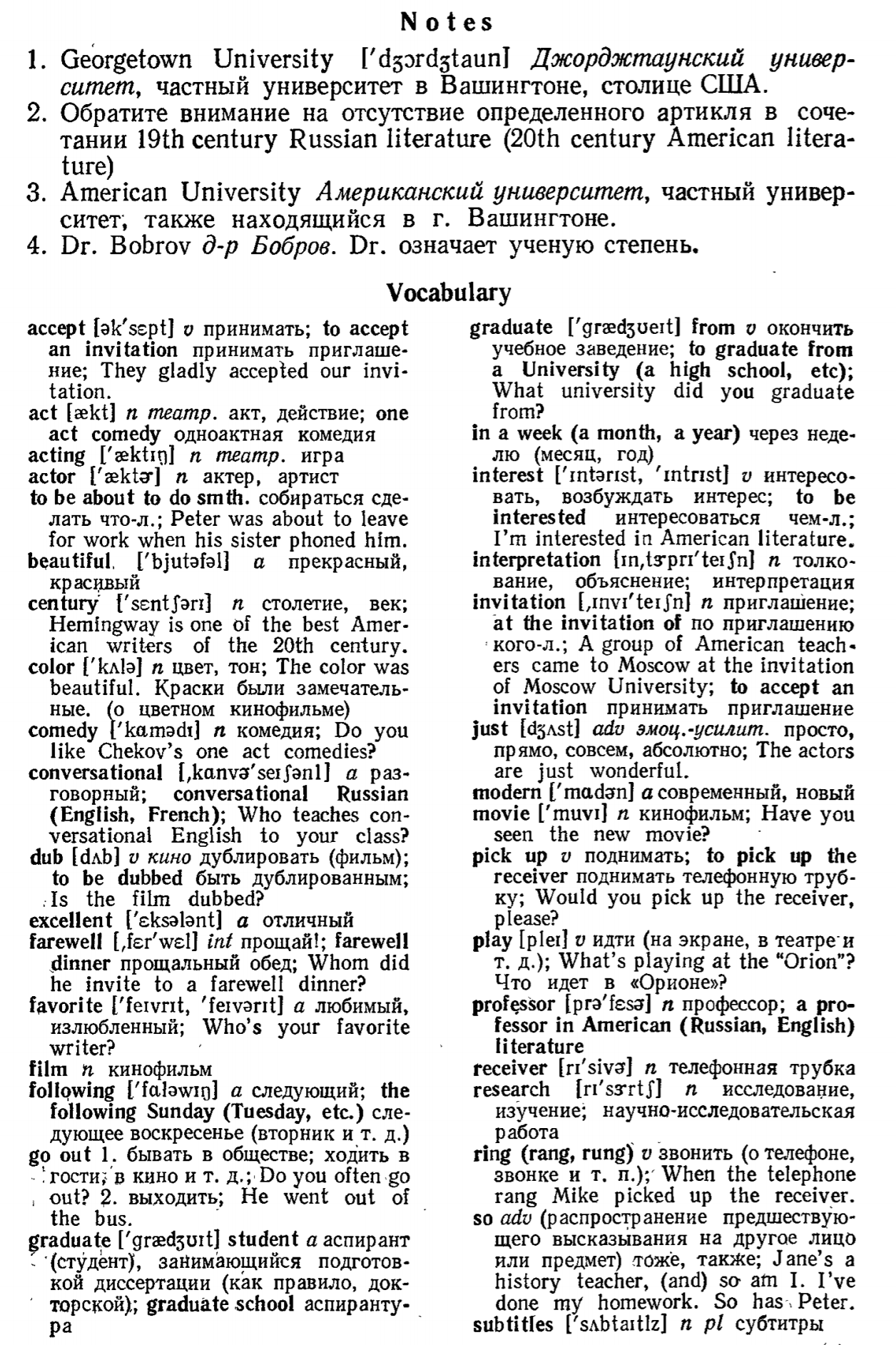
III. VOCABULARY, GRAMMAR AND SPEECH EXERCISES.
